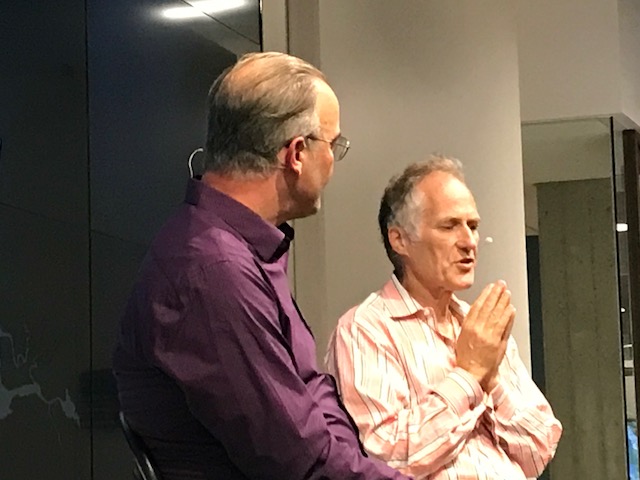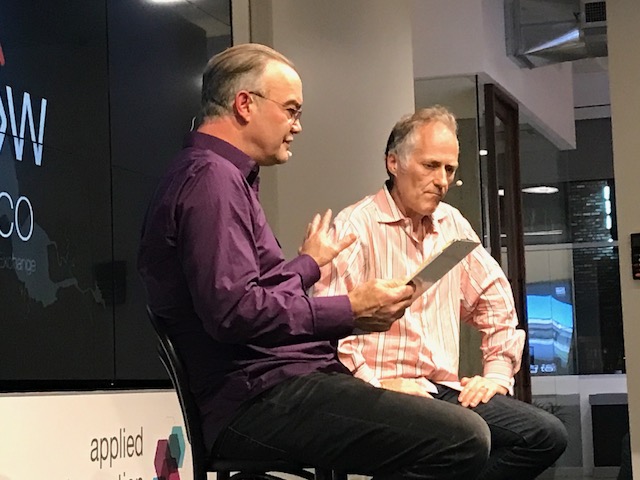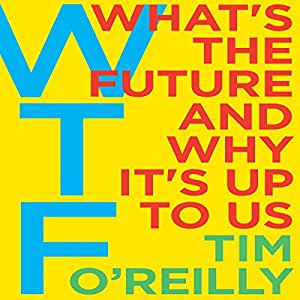Is the Next Economy a new buzz phrase in Silicon Valley or more profound and impactful? Tim O’Reilly thinks the latter, so much so that he has written a whole book focused on the Next Economy, where he reflects on how the current economic paradigm especially in technology is broken and how damaging it may be to humanity if we don’t turn things around.
Technology has been a big part of my professional life for well over two decades, so attending anything that Tim O’Reilly shows up at or leads is far from new to me. It should be no surprise then that I wound up at San Francisco’s Applied Innovation Exchange this week to watch Reinvent’s founder and CEO Peter Leyden interview Tim about his latest work: WTF: What’s the Future and Why It’s Up To Us, his first book aimed at a general audience.

Peter Leyden and Tim O’Reilly on The Next Economy
In this dialogue, he tossed out ideas (all addressed in his book) on how our economy should be restructured so that humanity benefits as much as tech giants’ financial pockets do moving forward.
The Next Economy
In thinking through how to evaluate the current economy and what the Next Economy should look like, he asks: What will happen to business when technology-enabled networks and marketplaces are better at deploying talent than traditional companies? How should companies organize themselves to take advantage of these new tools? What’s the future of education when on-demand learning outperforms traditional institutions? How can individuals continue to adapt and retrain? Will the fundamental social safety nets of the developed world survive the transition, and if not, what will replace them?
In the book, O’Reilly shares the techniques he’s used at O’Reilly Media to make sense of and predict past innovation waves and applies those same techniques to provide a framework for thinking about how today’s world-spanning platforms and networks, on-demand services, and artificial intelligence (AI) are changing the nature of business, education, government, financial markets, and the economy as a whole.
We chatted about new ideas and ways that modern digital businesses can work together to create marketplace advantage and customer value, while also providing human value. In other words – they cannot have sustainable success unless their ecosystem succeeds along with them.

While many are feeling the sad and sorry implications of technology businesses’ focus on cutting costs to merely enrich their shareholders, O’Reilly throws it out there in a direct and raw way so everyone can truly see it for what it is. This is the new reality unless we turn things around. Says Tim, “Technology is the solution to human problems, and we won’t run out of work till we run out of problems.”
He asserts that entrepreneurs need to set their sights on how they can use big data, sensors, and AI to create amazing human experiences and the economy of the future, making us all richer in the same way the tools of the first industrial revolution did.
In his book, he writes “Everything is amazing, everything is horrible, and it’s all moving too fast,” leaving far too many people feeling nervous about a future, where robots take most of the human jobs.
He reminds us that it’s up to creators, inventors and technologists to make sure our future is one that helps not just move technology forward but humanity as well. And, that it’s the creators of “unicorns,” who can make technology that free us to pursue more creative work.
 He says that we must craft policies that support, encourage and reward the kinds of work that only humans can do for each other, asserting that networked marketplace platforms can be a powerful tool in shaping the next economy. This may or may not result in human beings being augmented to do things that were previously impossible.
He says that we must craft policies that support, encourage and reward the kinds of work that only humans can do for each other, asserting that networked marketplace platforms can be a powerful tool in shaping the next economy. This may or may not result in human beings being augmented to do things that were previously impossible.
That said, he reminds us that policy and politics are different and rarely do the most innovative ideas we throw out there get executed.
He writes, “despite our best efforts, most of the time we fail to respond to potentially catastrophic consequences of changes that are already under way.” History shows us this btw. Yet, despite lessons learned from our past, we still haven’t made the hard choices to fundamentally restructure our economy.
Quoting Bill Gates who once wrote “we always overestimate the change that will occur over the next two years and underestimate the change that will occur in the next ten. Don’t let yourself be lulled into inaction.”
“Don’t Let Yourself be Lulled into Inaction.” — Bill Gates
Tim addresses the numerous things that come into play, including policy, regulations, renewable energy, AI (he brings up the different types of AI and their implications), insurance, public transportation, infrastructure services, digital music, self-driving cars, solar power, national security, climate change and beyond.
On climate change, he talks about the climate critics who like to cite the cost of dealing with global warming rather than understanding while they are costs to existing industries, putting up roadblocks is counter to growth and change. More importantly, it means that we miss taking advantage of opportunities for new industries which can exploit the new technology. Digital music distribution is a great example of course.
Other changes NEED to happen if we’re going to thrive in the future, that have far more implications then how we consume music. For example, energy. With the growth that is happening, he quotes Saul Griffith who asks us to seriously consider how nine billion people will be able to live as well as two billion people do today without radical changes to the economy. “It’s just not feasible.”
Saul Griffith who has developed a detailed analysis of how much energy waste there is, and assigns it to the right industry categories, is convinced that we base energy policy on false assumptions.
It’s Up To Us To Get It Right
O’Reilly asserts that we as developers, creators and innovators need to get it right, for the implications for humanity if we don’t, are quite profound.
Let us better think through what the impact of existing technologies we’re building now and will create in the future, has on the future of work, our personal lifestyle, how we interact with each other and whether that exchange is healthy or not (think of the growing research data that shows a very direct correlation between depression and social media “likes” on millennials today).
What about the impact on our health? On our happiness? Our well-being? And, most importantly, humanity as a whole?
While you may not think you can have an impact on any of these issues just because you’re not creating robots or perfecting self-driving trucks, O’Reilly suggests that we all can take an active role in “getting it right.”
I concur. We all have an opportunity to speak up on what matters to us in our lives, so that those in the power seats build the next economy in a way that serves humanity, not suck it dry. There’s never been a time in our history where so many individuals can speak up and be heard, not just in our local community but globally.
One voice may not do the trick, but the ripple effect of thousands of individual voices speaking up, can. That ripple effect my friends, can be powerful if we believe we have the ability to change. And, the next economy must reflect people’s human needs. I’d add that not only should people’s needs be addressed but put first.
Below is a short video clip I took that captures a fraction of the talk.
For more information on Tim O’Reilly’s world, visit his page on O’Reilly Media, ta conference he does on the Future of Work that just happened in mid-October, his global events. You can head on over to Amazon to purchase his latest book that addresses the next economy as well…as noted above: WTF: What’s the Future and Why It’s Up To Us.
Be sure to also check out our technology page, as well as our section on Events. Also see our Spirituality and Wellness sections, both for a look at alternative ways of living to ensure a more holistic and balanced life.

Renee Blodgett is the founder of We Blog the World. The site combines the magic of an online culture and travel magazine with a global blog network and has contributors from every continent in the world. Having lived in 10 countries and explored over 90, she is an avid traveler, and a lover, observer and participant in cultural diversity. She is also the founder of the Magdalene Collection, a jewelry line dedicated to women’s unsung voices and stories, and the award-winning author of the bestselling book Magdalene’s Journey
She is founder of Blue Soul Media and co-founder of Blue Soul Earth as well as the producer and host of the award-winning Blue Soul CHATS podcast, that bridges science, technology and spirituality. Renee also founded Magic Sauce Media, a new media services consultancy focused on viral marketing, social media, branding, events and PR. For over 20 years, she has helped companies from 12 countries get traction in the market. Known for her global and organic approach to product and corporate launches, Renee practices what she pitches and as an active user of social media, she helps clients navigate digital waters from around the world. Renee has been blogging for over 16 years and regularly writes on her personal blog Down the Avenue, Huffington Post, BlogHer, We Blog the World and other sites. She was ranked #12 Social Media Influencer by Forbes Magazine and is listed as a new media influencer and game changer on various sites and books on the new media revolution. In 2013, she was listed as the 6th most influential woman in social media by Forbes Magazine on a Top 20 List.
Her passion for art, storytelling and photography led to the launch of Magic Sauce Photography, which is a visual extension of her writing, the result of which has led to producing six photo books: Galapagos Islands, London, South Africa, Rome, Urbanization and Ecuador.
Renee is also the co-founder of Traveling Geeks, an initiative that brings entrepreneurs, thought leaders, bloggers, creators, curators and influencers to other countries to share and learn from peers, governments, corporations, and the general public in order to educate, share, evaluate, and promote innovative technologies.








